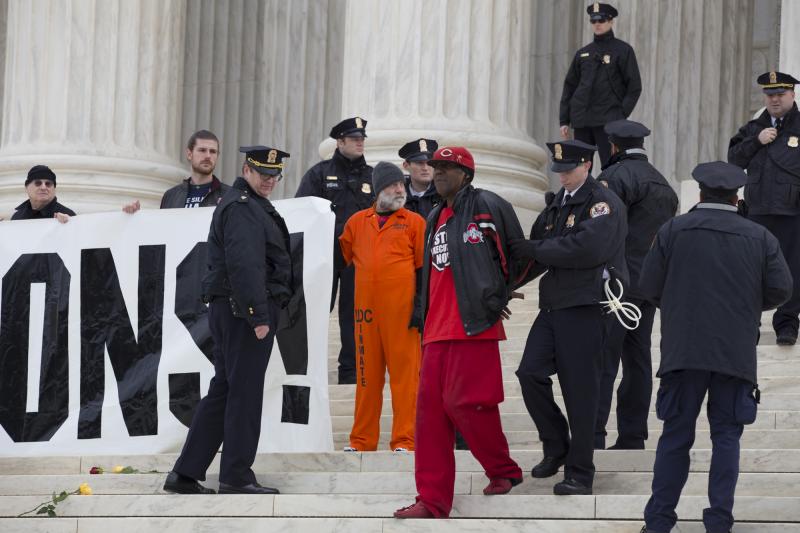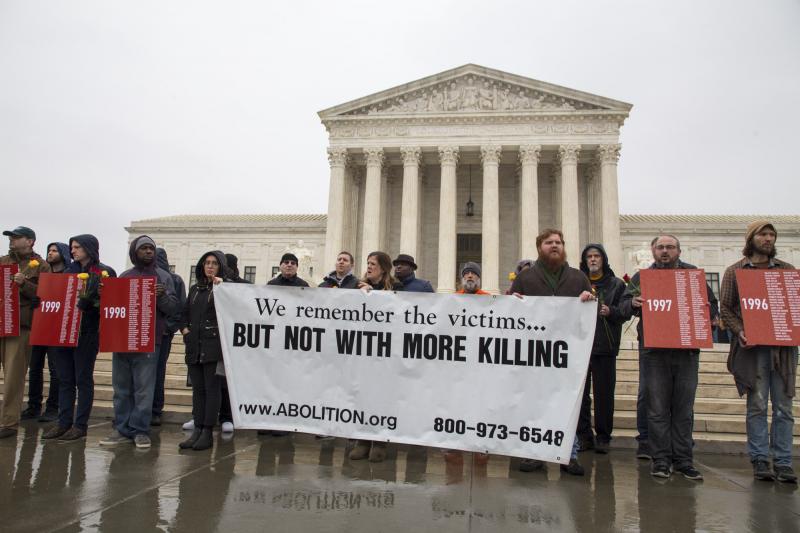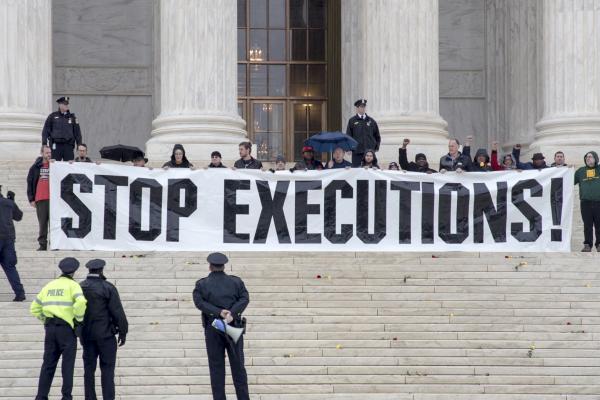On a wet January day — as the nation’s capital preps for Inauguration Day and the Women’s March on Washington — more than 80 anti-death penalty protesters sang, prayed, and chanted on the steps of the U.S Supreme Court. Eighteen were arrested for nonviolently proclaiming their beliefs.
The protestors, including Sojourners Chief Church Engagement Officer Lisa Sharon Harper, held a large white banner with the words “Stop Executions” written on it as they stood on the highest steps on the Supreme Court building — forbidden to protestors.
Protestors on the lower steps held flowers and large red placards with the names of executed individuals on them.
“We are standing with families who have had their loved ones murdered and families who have had their loved ones executed or put on death row,” said activist Shane Claiborne, who was arrested during the protest.
“Violence is a disease not the cure,” he continued. “As families themselves say, remember our loved ones but not with more killing. That’s our message today.”
dp-scotus-7.jpg

This protest brought together leaders from faith-based civil rights organizations including Sojourners, supporters of the cause, and people directly affected by the Supreme Court’s death penalty decisions.
First-time death penalty protestor Don McCraw of Baltimore said he remembers being conflicted about death penalty.
“I didn’t really think at first that I had an opinion about it,” McCraw said, adding it was mostly due to his own ignorance about how the American government deals with people on death row.
“For me to have knowledge, I need to hear stories about people who have reasons to want the death penalty and still don’t support it.”
Stories like Bill Pelke’s.
Death penalty issues are deeply personal for Pelke, co-founder of Journey of Hope, an organizing partner of the rally. His grandmother was brutally murdered by a 15-year-old girl who was later sentenced to death for the murder.
“Originally I supported that decision, but I became convinced beyond a shadow of a doubt that my grandmother would have been appalled,” Pelke said. “I was convinced that she would have had love and compassion for this girl and for her family.”
Pelke began working in justice and peace amid his own complex healing process. He began to understand how terribly the death penalty affects both the murder victim’s family as well as the people who commit the crime.
dp-scotus-4.jpg

“The death penalty has nothing to do with the healing of the victim's family,” Pelke said. “It continues the cycle of violence.”
Tevyn East, a participant from Pennsylvania, said she believes her faith binds her to her beliefs about executions.
“Jesus died because of a state-sanctioned violence, so I see it as a faith issue,” she said.” I believe it’s in our best interest to turn towards more restorative justice.”
This rally was organized by a group called Abolition Action Committee, an ad hoc group of activists dedicated to voicing their beliefs in highly visual, nonviolent ways. The group organizes a protest every five years on Jan. 17 — the anniversary of the first lawful execution in the U.S. Since Gary Gilmore’s execution in Utah on Jan. 17, 1977 for the murders of Ben Bushnell and Max Jenson, there have been 1,442 executions in the United States — an issue that many protests find alarming.
WATCH: Sojourners' Lisa Sharon Harper arrested at the protest.
Faith leader Tony Campolo said he believes this movement is a call for people of faith to take up their mantle and fight for justice and mercy.
“The thing that people think of when they think of evangelical Christians is that here’s a group of people who are for the death penalty, who are opposed to immigrants, who are homophobic, who raise questions about the feminist movement, and we say to ourselves, is that who we are?” Campolo said.
“We are not sure we can be called evangelical anymore if that’s what evangelicalism means to the general public.”
Got something to say about what you're reading? We value your feedback!

